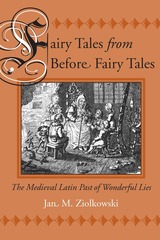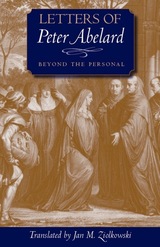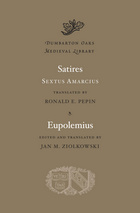
The Cambridge Songs, from the Latin Carmina Cantabrigiensia, is the most important anthology of songs from before the thirteenth-century Carmina Burana. It offers the only major surviving anthology of Latin lyric poems from between Charlemagne and the Battle of Hastings. It contains panegyrics and dirges, political poems, comic tales, religious and didactic poems, and poetry of spring and love. Was it a school book for students, or a songbook for the use of professional entertainers? The greatest certainty is that the poems were composed in the learned language, and that they were associated with song. The collection is like the contents of an eleventh-century jukebox or playlist of top hits from more than three centuries.
This edition and translation comprises a substantial introduction, the Latin texts and English prose in carefully matched presentation, and extensive commentary, along with appendices, list of works cited, and indices.

Nigel of Canterbury, also known as Longchamp and Whiteacre, wrote toward the end of the so-called Twelfth-Century Renaissance. He was a Benedictine monk of Christ Church when Thomas Becket was martyred, and a star of Anglo-Latin literature while the Angevin kings held sway over a vast empire that encompassed not only the British Isles but also western France.
The Dumbarton Oaks Medieval Library volume features, alongside the Latin, the first-ever English translation of Nigel’s second-longest poem, Miracles of the Virgin. The Miracles is the oldest extant collection of versified miracles of Mary in Latin and indeed in any language. The seventeen narratives, telling a gamut of tales from diabolic pacts to pregnant abbesses, gave scope for Nigel to display skills as a storyteller and stylist, while recounting the miraculous mercy of the Virgin. This supplement offers an extensive commentary to facilitate appreciation of the Miracles as poetry by a medieval writer deeply imbued in the long tradition of Latin literature.


When did fairy tales begin? What qualifies as a fairy tale? Is a true fairy tale oral or literary? Or is a fairy tale determined not by style but by content? To answer these and other questions, Jan M. Ziolkowski not only provides a comprehensive overview of the theoretical debates about fairy tale origins but includes an extensive discussion of the relationship of the fairy tale to both the written and oral sources. Ziolkowski offers interpretations of a sampling of the tales in order to sketch the complex connections that existed in the Middle Ages between oral folktales and their written equivalents, the variety of uses to which the writers applied the stories, and the diverse relationships between the medieval texts and the expressions of the same tales in the "classic" fairy tale collections of the nineteenth century. In so doing, Ziolkowski explores stories that survive in both versions associated with, on the one hand, such standards of the nineteenth-century fairy tale as the Brothers Grimm, Hans Christian Andersen, and Carlo Collodi and, on the other, medieval Latin, demonstrating that the literary fairy tale owes a great debt to the Latin literature of the medieval period.



Once upon a time, there lived a humble juggler, Barnaby by name, who was skillful but suffered every winter from poverty. A devotee of the Virgin, he had few failings apart from enjoying drink a little too much. One day he met a monk, who persuaded him to enter a monastery. All the brethren had exceptional skills to exercise on behalf of Mary, but the juggler felt he had nothing worthy to offer. Finally, he had the notion to juggle copper balls and knives before the altar of the Virgin in the chapel. The others caught him in the act and deemed his behavior madness, but after seeing the Mother of God descend to soothe him, they realized that he was blessed.
Writers, illustrators, and musicians from the Middle Ages to the present have loved this simple, medieval tale. In 1890, Anatole France (1844–1924) adapted the original poem as the short story “Le jongleur de Notre-Dame.” Dumbarton Oaks is pleased to bring this version back into print for the enjoyment of modern audiences, featuring a translation by Jan M. Ziolkowski and Art Deco illustrations by Maurice Lalau (1881–1961), faithfully reproduced from a 1924 printing.

Once upon a time, there lived a humble juggler, Barnaby by name, who was skillful but suffered every winter from poverty. A devotee of the Virgin, he had few failings apart from enjoying drink a little too much. One day he met a monk, who persuaded him to enter a monastery. All the brethren had exceptional skills to exercise on behalf of Mary, but the juggler felt he had nothing worthy to offer. Finally, he had the notion to juggle copper balls and knives before the altar of the Virgin in the chapel. The others caught him in the act and deemed his behavior madness, but after seeing the Mother of God descend to soothe him, they realized that he was blessed.
In 1890, Anatole France (1844–1924) adapted this medieval French poem as the short story “Le jongleur de Notre-Dame,” republished in 1906 with illustrations by Henri Malteste (1881–1961)—who signed his work “Malatesta”—a specialist in medievalesque illustrations and calligraphy. Dumbarton Oaks is pleased to bring this version back for the enjoyment of modern audiences both young and old, with artwork reproduced from original gouaches, and a translation by Jan M. Ziolkowski facing the French text.


James Loeb (1867–1933), one of the great patrons and philanthropists of his time, left many enduring legacies both to America, where he was born and educated, and to his ancestral Germany, where he spent the second half of his life. Organized in celebration of the sesquicentenary of his birth, the James Loeb Biennial Conferences were convened to commemorate his achievements in four areas: the Loeb Classical Library (2017), collection and connoisseurship (2019), psychology and medicine (2021), and music (2023).
The subject of the inaugural conference was the legacy for which Loeb is best known and the only one to which he attached his name—the Loeb Classical Library, and the three series it has inspired: the I Tatti Renaissance Library, the Dumbarton Oaks Medieval Library, and the Murty Classical Library of India. Including discussions by the four General Editors of each Library’s unique history, mission, operations, and challenges, the papers collected in The Loeb Classical Library and Its Progeny also take stock of these series in light of more general themes and questions bearing on translations of “classical” texts and their audiences in a variety of societies past, present, and future.

The first English translation of the earliest Latin poems about miracles performed by the Virgin Mary, composed in twelfth-century Canterbury by a Benedictine monk who inspired Chaucer.
Nigel (ca. 1135–1198), a Benedictine monk at Christ Church in Canterbury, is best known for The Mirror of Fools—a popular satire whose hero Burnellus the Ass is referenced in Chaucer’s Canterbury Tales. Nigel’s oeuvre also includes other important poems and hagiography.
The Miracles of the Virgin is the oldest Latin poem about miracles performed by Mary. This collection features seventeen lively tales in which the Virgin rescues a disappointed administrator from a pact with the devil, has a Roman emperor killed by a long-dead martyr, saves a Jewish boy from being burned alive, and shields an abbess from the shame of pregnancy. Each story illustrates the boundlessness of Mary’s mercy. In the Tract on Abuses, a letter that resembles a religious pamphlet, Nigel rails against ecclesiastical corruption and worldly entanglements.
Alongside authoritative editions of the Latin texts, this volume offers the first translations of both works into English.

Composed in Germany by a monastic poet steeped in classical lore and letters, the Satires of Amarcius (Sextus Amarcius Gallus Piosistratus) unrelentingly attack both secular vices and ecclesiastical abuses of the late eleventh century. The verses echo Horace and Prudentius, are laced with proverbs and polemic, and portray vividly aspects of contemporary life—the foppery of young nobles, the vainglory of the nouveaux riches, the fastidiousness of debauched gluttons. This is the first English translation of the Satires.
The Eupolemius is a late-eleventh-century Latin epic that recasts salvation history, from Lucifer’s fall through Christ’s resurrection. The poem fuses Greek and Hebrew components within a uniquely medieval framework. At once biblical, heroic, and allegorical, it complements the so-called Bible epics in Latin from late antiquity and the refashionings of biblical narrative in Old English verse. It emulates classical Latin epics by Virgil, Lucan, and Statius and responds creatively to the foundational personification allegory by the Christian poet Prudentius. The poem was composed by an anonymous German monk, possibly the author who used the pseudonym Amarcius. Although it focuses on events of both the Hebrew Bible and New Testament, it is also rooted in its own momentous times.

Solomon and Marcolf is known for being both important and mysterious. It pits wise Solomon, famous from the Bible, against a wily peasant named Marcolf. One of its two parts is a dialogue, in which the king and jester, sage and fool, prophet and blasphemer bandy back and forth questions and comments. Whereas Solomon is solemn and pompous, Marcolf resorts to low language and earthy topics. The other part comprises twenty short chapters in which Marcolf tricks Solomon time and again. These episodes are as impudent and scatological as is the dialogue. Together, the two parts constitute a rudimental prose novel or “rogue biography.”
Cited by Bakhtin in Rabelais and His World, Solomon and Marcolf is widely known by name. But until now it has not been translated into any modern language. The present volume offers an introduction, followed by the Latin and English, detailed commentary, and reproductions of woodcut illustrations from the 1514 edition. Appendixes help readers understand the origins and influence of a work that was composed around 1200, that attained its greatest popularity in the fifteenth and sixteenth centuries, and that has the potential still today to delight and instruct.

The Latin prose Solomon and Marcolf, enigmatic in origins, has been a puzzle from long before the sixteenth-century French author François Rabelais through the twentieth-century Russian critic Bakhtin to today. Though often called a dialogue, the second of its two parts comprises a rudimentary novel with twenty episodes. In 2009 the “original” received at last an edition and translation with commentary as the first volume in the Harvard Studies in Medieval Latin series.
Solomon and Marcolf: Vernacular Traditions, the fourth volume in the series, displays the mysteries of the tradition. Solomon relates to the biblical king, but did Marcolf originate in Germanic or Eastern regions? Here lovers of literature and folklore may explore, in English for the first time, relevant texts, from the twelfth through the early eighteenth century. These astonishingly varied and fascinating pieces, from Iceland in the North and West through Russia in the East and Italy in the South, have been translated from medieval and early modern French, Russian, German, Icelandic, Danish, and Italian. The book opens with snapshots of two nineteenth-century polymaths, the Englishman John M. Kemble and Russian Aleksandr Veselovskii, whose hypotheses can now be evaluated. An appendix documents awareness of Solomon and Marcolf in late medieval and early modern times.

The Latin prose Solomon and Marcolf, enigmatic in origins, has been a puzzle from long before the sixteenth-century French author François Rabelais through the twentieth-century Russian critic Bakhtin to today. Though often called a dialogue, the second of its two parts comprises a rudimentary novel with twenty episodes. In 2009 the “original” received at last an edition and translation with commentary as the first volume in the Harvard Studies in Medieval Latin series.
Solomon and Marcolf: Vernacular Traditions, the fourth volume in the series, displays the mysteries of the tradition. Solomon relates to the biblical king, but did Marcolf originate in Germanic or Eastern regions? Here lovers of literature and folklore may explore, in English for the first time, relevant texts, from the twelfth through the early eighteenth century. These astonishingly varied and fascinating pieces, from Iceland in the North and West through Russia in the East and Italy in the South, have been translated from medieval and early modern French, Russian, German, Icelandic, Danish, and Italian. The book opens with snapshots of two nineteenth-century polymaths, the Englishman John M. Kemble and Russian Aleksandr Veselovskii, whose hypotheses can now be evaluated. An appendix documents awareness of Solomon and Marcolf in late medieval and early modern times.
READERS
Browse our collection.
PUBLISHERS
See BiblioVault's publisher services.
STUDENT SERVICES
Files for college accessibility offices.
UChicago Accessibility Resources
home | accessibility | search | about | contact us
BiblioVault ® 2001 - 2024
The University of Chicago Press









